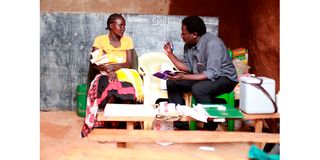West Pokot: Home deliveries leading to mother, infant deaths

A public health official in West Pokot County explains to a mother how to feed her baby during an outreach session. Many women in the county underutilise safe motherhood initiatives.
What you need to know:
- Many women in West Pokot County underutilise safe motherhood initiatives including provision of free maternity services.
- More than 65 per cent of women in North Pokot Sub-county, for example, don’t deliver in hospitals due to cultural expectations.
Home deliveries and delay by expectant mothers to reach health centres has contributed to most maternal and child deaths in West Pokot County.
Many women in the county still underutilise safe motherhood initiatives including provision of free maternity services.
Those from remote areas give birth at home, while other expectant mothers delay to reach health centres to get help, leading to many deaths.
More than 65 per cent of women in North Pokot Sub-county, for example, don’t deliver in hospitals due to cultural expectations.
Kacheliba Sub-county hospital medical Superintendent Dr Solomon Tukei says most women in the area prefer to deliver at home with the help of traditional birth attendants because they are familiar with them.
“We are sensitizing women on the importance of delivering in hospitals. Am urging mothers from this community to deliver in hospitals since the government waived maternity costs. The community is pastoralist and regular movement in search of pasture makes it difficult for them to attend clinics,” he says.
He observes that the government will help lift health status because health needs are high in the area.
“Our county has up-scaled facilities, equipped health centres and improved infrastructure for specialists to use. We should be on the frontline to promote safe motherhood and child health in remote places,” notes Dr Tukei.
Pastoral communities
“We encourage residents to register with NHIF so that they can be able to seek quality medical services when need arises. Most pastoral communities prefer traditional medical help since it’s less expensive. The ministry is coming up with a plan to ensure everybody is insured. This will help residents stop balancing between going to hospital and staying at home,” he says.
According to West Pokot Health County Executive member (CEC) for health and sanitation Christine Apokoreng, who spoke to nation.africa from her office in Kapenguria, many women in pastoral areas in the county encounter many problems during delivery.
She called on women in remote parts of County to embrace hospital delivery and to get to hospital on time to avert maternal and child deaths.
Ms Apokoreng said the cases range from antenatal bleeding at home, obstructed labour complicated by the brutal FGM, foetal distress and present when unstable, very pale and in distress.
“The poor road network, communication network and long distance to health facilities complicate the matter further,” said Ms Apokoreng.
Calling for collective responsibility in teaching residents on the benefits of antenatal care, hospital delivery and proper nutrition, she noted that many women and their babies die in the villages due to complications brought about by unsafe home deliveries.
Antenatal visits
“Child spacing, especially to young girls aged 14 -17 years. We are thinking of offering incentives for mothers who go for antenatal visits as well as delivering within a hospital,” she said.
Ms Apokoreng asked locals to shun outdated cultural practices.
“We urge women to shun the tradition of women giving birth at home, which has led to many losses of lives among women and children,” she said.
She observed that only 35 per cent of women from the region attend health facilities for pregnancy check-ups and clinics, for delivery.
“Women should embrace clinics. Our mothers /sisters/ wives report to hospital very late after being managed at home, dispensary/health centre, and when they realize the situation has become complicated, they rush to the referral facility where very little can be done at that point, within a very short period,” she said.





